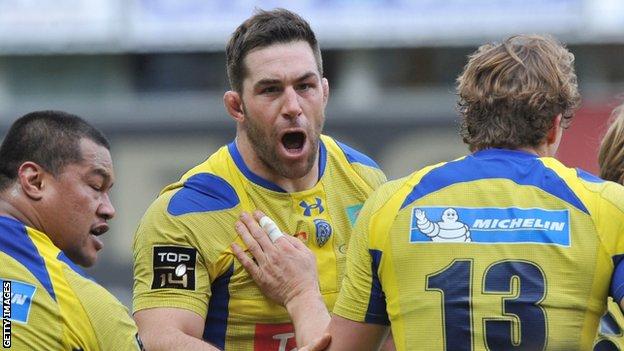
Former Canada international Jamie Cudmore has been supporting the ex-players at the centre of rugby union's dementia crisis, drawing on his landmark legal case against his old club.
The 42-year-old said he had been speaking to the group that includes England's World Cup winner Steve Thompson for the past six months, "helping them along the way" as they prepare to launch a class action.
Cudmore is suing French side Clermont Auvergne, whom he played for from 2005-2016, over their alleged failure to protect him from serious injury when he returned to the pitch after suspected concussions during the 2015 Champions Cup.
In January 2019, a court-appointed neurologist found the club were responsible for the harm Cudmore suffered, and his case has the potential to have major ramifications on the game.
Speaking to BBC Sport, he said his case is "not a money grab" and he hopes it marks a "line in the sand" towards improving education around head injuries and prompting improvements to the safety of the sport.
It emerged last week that a group of about eight players - including Thompson, former England team-mate Michael Lipman and ex-Wales international Alix Popham - are planning legal action against the game's authorities after being diagnosed with early signs of dementia.
It is understood a pre-legal letter of claim could go in as early as Tuesday.
"I've known about this process over the last six months, and the guys behind it," said Cudmore.
"I've been speaking to them, not advising but helping along the way. Clearly it's shocking for most people; for people inside the game not so much.
"It's very alarming that now the wider public understand the depth that this problem really does go and how we need to do a hell of a lot better as professional sportsmen, as coaches, administrators, to protect players a lot better.
"I'd say good luck [to them]. Because I've done an incredible amount of research and the governing bodies haven't done enough work in taking the data on, which is pretty much from the mid-70s."
Cudmore, now coaching in Canada, said rugby is "a hell of a lot safer than it was" but there is room for improvement.
"It is a contact sport and I don't want to change anything around that, but we can do a lot more about the treatment of concussion," he said.
In light of his experience in 2015 - when it is thought he suffered from 'second-impact syndrome' - Cudmore warned mistakes around concussion can have tragic consequences.
"In my case I was puking in the changing room in the 67th minute of a game," he said. "Do you really need to put the player back on? Well they did, they allowed me to go back on and unfortunately that's not good enough.
"In this day and age, if you do that with a young child you can kill them and we've had numerous instances of this happening and nobody should get to that point in their sporting careers and be that injured by someone's negligence."
Cudmore hopes his case will conclude early next year.
BBC Sport has approached Clermont for comment.


Source: BBC Rugby Union News
